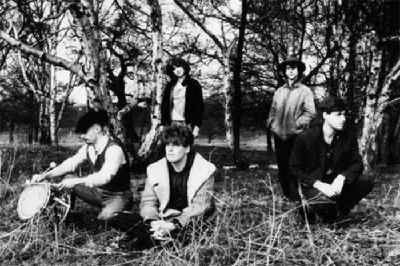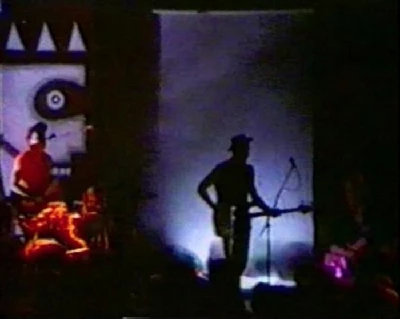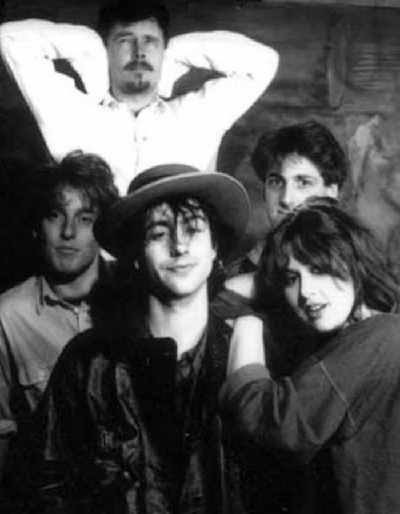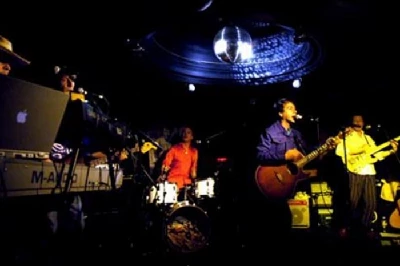published: 28 /
9 /
2007
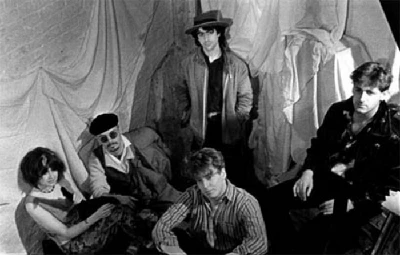
Rolo McGinty, the frontman with 80's indie/dance group the Woodentops, talks to John Clarkson about the group's history, its recent reformation, and its new CD, 'The BBC Sessions', which comprises of five radio sessions recorded between 1984 and 1988
Article
Saturday 28th January 1984. Loughborough University Student Union
The group on stage and at the bottom end of the four band bill are nervous. "It is our first ever show outside London" confesses the singer, a tall, earnestly awkward fellow with a gangling bush of dark hair, at 21 or 22 just a little older than the bulk of the audience of students, his voice an anxious chatter of energy.
"We've been together about nine or ten months now" he adds. There are five of them, the singer who also has an acoustic guitar stripped around his neck ; another guitarist again with an acoustic guitar : a bassist ; a drummer with a pork pie hat and a stripped down skiffle-type kit, and a glum-faced girl, the only female in the band, on a tiny set of keyboards.
"I'm Rolo" the singer says. "This is Jesus" he jokes about the guitarist, who is really called Simon, in between songs. No one in the audience of a hundred or so laughs.
Their set is played in a heated, hyper rush. The three guitarists' fingers flick frantically across their instruments. The drummer hammers his drumsticks onto his twin set of drums, pushing the others on to play their instruments faster, faster as his blurring arms strike down and down again against his skins. The girl, who is called Alice, raises her head up briefly to push her brown hair back behind her ears and to smile shyly at the audience, then rams it back down to focus intently on her Casio. Rolo's vocals are similarly frantic, a rapidly uncoiling rush of words.
One song, a super melodic number called 'Well, Well, Well', thrown in early into the set list and which a few of the crowd seem to know, wins them a steady round of applause. Their best song 'Plenty', about riots in their home patch of Brixton, which closes their 20 minute set, brings them some cheers and another louder this time round of clapping.
The group throw down their instruments, rush from the stage,some of them waving briefly at the crowd, relieved that it is over.
It has been not bad, by no means brilliant, the band a collective victim of their own shy terror as much as anything else, but yet despite of, in fact partially because of their wired stagefright far from terrible too.
"We're the Woodentops " says Rolo as final words back at the crowd, little evidence yet of what is just to come.
Tuesday 25th September 2007
It is 23 years later and the Woodentops are staging a comeback.
Rolo McGinty is on the phone to Pennyblackmusic from his home in South London to talk about the Woodentops’ decision to reform last year, and their new compilation, ‘The BBC Sessions’, which, just released on the Renascent label (the rightly-so self-proclaimed “planet’s coolest reissue label” and current home of the Sound, the Wild Swans, the Comsat Angels and the House of Love), comprises of five radio sessions recorded between September 1984 and January 1988, three for John Peel, one for Janice Long and one for Simon Mayo.
The Woodentops’ agitation and hypertense sound proved to be their dominant feature, their high-speed acoustic guitars and cheap Casios winning them across 1984 a steadily rising audience.
A single, ‘Plenty’, released in July of that year on Food Records, was an indie hit and won them much acclaim. It lead to a deal with Rough Trade Records, then a stream of other classic singles between August 1985 and May 1986 including ‘Move Me’, ‘Well, Well, Well’ and ‘Good Thing’, and finally in June 1986 their debut album, ‘Giant’, which found the band experimenting both with sequencers and samplers.
A live album, ‘Live Hypnobeat Live’, which came out the following year in 1987 and was recorded in Los Angeles, found the increasingly visionary group merging both old and new songs with both dance and techno beats.
A second studio album, ‘Wooden Foot Cops the Highway’, followed in February 1988. One of the most under-rated albums of the decade, it found new member Anne Stephenson from the Communards replacing Alice Thompson on keyboards, and added much grittier-sounding guitars and electronica to the beats and acoustics.
The Woodentops’ fortunes began, however, to wane the following year when, amidst personal problems, Rough Trade went into temporary receivership and their deal with CBS collapsed and in the early 90’s they went into hibernation.
The group’s reformation has seen original members, McGinty (vocals, guitar), Simon Mawby (guitar), Frank De Freitas (bass, and the brother of Echo and the Bunnymen drummer, the late Pete De Freitas) and drummer Benny Staples, all getting back on board.
There have been two tours of Europe, and there are plans for a third tour and a new album next year.
Rolo McGinty is charmingly belligerent on the phone, admitting to being “pissed off” at the news of the situation in Burma which has broken that day, laughing when I tell him about myself, aged 18 and a term and a bit into university catching the Woodentops at the Loughborough show, and asking if they were “shit”, claiming that they were. We wind back the years.
PB : The Woodentops is the name of a 50's children's television show and it is also a slang name for an acoustic guitar. From which of those did you take your name ?
RM : It was from a lot of things. The whole thing with the acoustic guitar really suited us because that was what we were, an acoustic guitar band. The TV programme was appealing as well because there was a little binder of people of a certain age that saw that when they were like little kids in the 60’s and we were all some of those kids. There is also an idiot connotation as well which we liked and it is also the slang for coppers. It just had loads and loads of funny meanings which really appealed to us. It also didn’t sound like the name of a race horse which nearly all the names of the bands around us had (Laughs).
PB : Had any of you played in bands before you formed the Woodentops ?
RM : Alice had played in an early line-up of the Jazz Butcher. I had lived in Liverpool for a while and had done a tiny bit with the Wild Swans who were based there. Before that I did a bit of work with a Motown/Clash kind of group called the Upset that supported Dexy's Midnight Runners for a few months. That was the first thing I really ever did.
When I was in the Wild Swans I got my bass nicked in Glasgow Apollo, and it was actually Bill Drummond (the founder of the KLF and the owner of Zoo Records, the Wild Swans’ label-Ed) who made sure that I got the insurance for that, which bought me a new bass, a Casio keyboard and a drum machine. That is basically how I began writing songs and how the Woodentops started up.
PB : You spent a lot of the summer rehearsing and playing gigs in a warehouse in South London in 1983. It has drawn all sorts of comparisons latterly with Andy Warhol's Factory in New York. Was it really that kind of place ?
RM : It really was. We weren't really aware of it at the time, but in retrospect yes. There were actually three floors, but it was essentially divided into six large rooms and all of those large rooms had different stuff going on in them. Most of it was to do with graphic design and art, as that was what Panni Bharti, who was the lease owner and who subsequently designed a lot of the Woodentops covers, did. We just had a little music room down at the bottom.
PB : How did you end up there originally ?
RM : I helped to clear the room out and to set up a rehearsal room in there. It wasn't my room or anything, but then I sort of pinched it (Laughs) and brought my band in there. It was a pound a day. We could afford to pay that and it became our home. We were just part of the scene there really.
PB : How long did the warehouse last ?
RM : It is still there now. Dan Pearson, the city gardener on Channel 4, has the room which was ours. I moved back there for a while in the 90's. I had a room on the top floor for about a year and a half, while I was working on a lot of post Woodentops stuff.
PB : The Woodentops attracted a lot of attention initially for playing your instruments really fast and then even faster during the stage shows. Was that something you did from the outset and right from when you were in the warehouse ?
RM : I didn't really notice it was happening at first. It was just something that we did and people said "Oh, that's really fast." We did played faster in front of an audience that we did in the rehearsal room, but then after a while it didn’t feel right on stage unless we were playing like that. Initially at first it was down to a combination of excitement and nerves. Benny and I used to really take the speed up. We were the best speed freakers (Laughs).
PB : The band listed a lot of punk groups as an early influence, but there’s not very much of an element of that in either your early or latter sound. Would it be fair to say that you were a group who quickly moved beyond your influences and out grew them ?
RM : Yes, definitely. The funny thing is a lot of people have said "Oh ! You sound like the Feelies" , but we didn't know who the Feelies were at the time, so, no, that was wrong. We did love the Velvet Underground, but we tried not to copy them. I think the only band that we ever let ourselves be influenced by was Suicide. Suicide was an amalgamation of lots of things we were into anyway ranging from Iggy Pop to Kraftwerk to 60's punk. We couldn't , however, afford a lot of equipment. We couldn't afford to be Kraftwerk, so that was really where our sound came from because, like Suicide, we had to do it on odd-sounding instruments, and in our case cheapo acoustic instruments and a tiny little Casio. That is how our sound came about really. When I chugged my guitar the way I did, I was in a way trying to make it like a sequencer, really, really in synchronisation.
PB : You toured with both the Smiths and Julian Cope. Were those good experiences or bad experiences ?
RM : The experience with Julian Cope was exquisite. He was the first person to really pick up on us. We really loved him. It was really weird because we turned up on the first date of the tour and he had almost exactly the same equipment as us. We were a real Casio band, and there to our amazement when we first arrived at the first gig there was Copey and his band, all with Casios. We were like "Oh no" (Laughs), but in fact it worked out really well and was a great tour.
PB : Did you know him from when you had lived in Liverpool ?
RM : I did know him. I had had a lot of fun with him and Pete De Freitas and the Bunnymen as well. In fact one of the reasons why that tour came about was because I did two auditions for Julian when he was in the Teardrop Explodes. I got very close to joining them, and, thank God, I didn't, When the Wild Swans were looking for someone, Julian in fact said "Get in touch with him.”
PB : You said thank God you didn’t end up in the Teardrop Explodes. Why do you say that ?
RM : Because I would never have done anything that I did since. It would have fucked me over. Julian has told me that himself. I think I would have just gone crazy in that band. I would have done too much acid or whatever. They were also beginning to wind down and weren’t at their peak at that stage.
PB: What about the Smiths ? How did you get on with them ?
RM : Johnny Marr was great. Andy Rourke was great. Mike Joyce was great, but we didn’t get on with Morrissey at all . I thought he sounded exactly like Paul Simpson, who sung for the Wild Swans and I couldn't take him seriously (Laughs), but we did get slung off that tour, so I suppose I am never really going to have that much time for him as a result.
PB : Why did you get slung off the tour ?
RM : This guy, Dave Harper, who used to drive us quite regularly, was driving for the Smiths on that tour in his old Merc. We had to get to the venue before the Smiths as had to do our sound check first . We were trying to get there on time and as were driving our car up the motorway we saw Dave and the Smiths in the Merc and tooted the horn and waved. Dave waved back and at the same time there was this bump in the road and the two cars went slightly tighter together. It wasn't scary or anything. They just went slightly closer together, but Morrissey looked up at that point squarely into my face (Laughs) and thought that he was going to die and, as I was one behind the wheel, it was my fault. I actually shouted at him "You're not going to die, mate" and then when we got to the other end we were sacked.
Mind you, I hate to say it but a lot of flowers were on stage before they actually came on. We were pretty close to blowing them away every night before they came on and I think he was pretty keen to get rid of us anyway.
PB : You signed to Food Records to record 'Plenty' and then to Rough Trade. Did 'Giant' take a long to record or did you record it really quickly ?
RM : It was recorded very quickly, but we had to go in rehearsal with the producer first. It was pretty hard, enclosed stuff. He would sit there with his legs crossed and lots of bits of paper and write things down. We had to work out exactly what we were going to do before we went into the studio, which was the complete opposite of what we had done before. Things had always been pretty raw in the studio. In retrospect I quite liked the way we did 'Giant' but at the time I rebelled against it because it just didn't seem rough enough for me. That was why we did the live album, ‘Live Hypnobeat Live’, almost immediately afterwards.
We did with a lot with Linn drums and samples on 'Giant'. We would write our own material and sample. We used a lot of sequencers as well. It was really interesting. I was really up for it. What I didn't like about the album was that it was not so much how it sounded when we recorded it, but how it sounded when it was mixed. It was mixed very much for radio and it was quite sort of trebly and tinny. It didn't have a lot of whack coming from underneath which is what we were used to. It is quite a well-crafted album but it doesn't have half as much of a rhythm as were accustomed to.
PB : ‘Wooden Foot Cops the Highway’ was released in early 1988. It sounds incredibly fresh nearly 20 years on. How do you feel about one?
RM : I think there are a some great tracks on there. One of the trackz I really like is 'Heaven'. There is one on there which I can't stand anymore, which is ‘They Say What They Want'. That one just annoys me (Laughs). 'Maybe it Won't Last’ is pretty cool as well and 'Stop That Car' is brilliant too. That last number is really cool. I am really happy about that whole period just because of that one particular song.
A golden period for the Woodentops, however, was definitely all those early singles before we did 'Giant'. That collection of tunes makes up a really good first album.I know those songs were released on a compilation, but it was never actually an official album It is a shame because I think it would have made a great album to have all that stuff like 'Well Well Well' and “Move Me’ on.
PB : Your latter records had a far grittier sound and put more emphasis on electronica. Were you getting bored with acoustic guitars by that stage ?
RM : No, not at all. What I really liked was to do something as experimental as possible and then to throw the acoustic guitar over the top of it. We felt limited writing songs that started with the acoustic guitar, so we thought "Let’s try it the other way round. How am I going to fit my acoustic guitar on that ?"
PB : How do you feel about the new ‘BBC Sessions’ compilation ?
RM : I am really pleased with that.
PB : Those BBC Sessions were recorded notoriously quickly, usually in a space of about four hours each. Was it a nerve wracking experience doing those ?
RM : Yeah, especially those early ones because we were really green when we did them .There were four songs on our first session with John Peel. I took one of them off, 'Get It On', because we had already released that. We had licensed it and released it, so there didn't seem a point putting that on, and then there was another one, 'The Last Time Alive', which we also did for our first session and I felt we did a much better job of later on for our second Peel session so we kept that one instead. We recorded it again something like a year or two later.
PB : Were you in some ways road testing material when you did thoe sessions because a lot of the tracks actually ended up in a more defined form on the albums ?
RM : Totally. That was the really good thing about those sessions. It is really nice to hear those songs now before they appeared in a more blown up form. You didn’t really know when you were doing them if you had finished the lyrics yet, or if the guitar solo had been fully worked out. There are mistakes on there and there's really quite shy singing at times. They're nice. I really like them.
PB : The early songs were recorded for John Peel who was on late at night. The middle sessions were recorded for Janice Long who did the mid evening slot at the time and the last session was recorded with Simon Mayo who was on during the day. Was that a sign of the band's growing popularity ?
RM : It must have been because there we were suddenly on at peak time, weren't we ? We were touring a lot and I was a bit zonkified and I didn't know who Simon Mayo was when we did our session for him. The ones that really meant a lot to me were the three sessions we did for John Peel. I was a John Peel under-the-pillow listener. His voice was part of my teenage life and I heard many a thing I grew to love first time on John Peel.
PB : The group began to go through a rough patch from 1989 onwards. Pete De Freitas was killed in a motorbike accident. Did that have a really serious impact on the band's morale ?
RM : There was a lot of bad shit going down anyway and Pete’s death really nailed things on the head.
Just before he died Pete came to see us on this really beautiful, stripped down motorcycle. Frank and I were outside looking at it and I stroked my hand across its seat and I said "I don't know. It's a death machine" and Frank said "I know. It scares the hell out of me as well". And then Pete was killed almost imemdiately after that
We were touring with the Pogues and were in Germany and Frank had to get on a plane, deal with family business, come back, play a few more dates and then go back for the funeral. We wanted to cancel the tour, but he was like "No, I want you to do it. I need something to focus on."
Frank is actually the nicest person in the band and it was really hard to go through that with him. There was other stuff going on too. There were problems with Rough Trade as well and ultimately we found that it was because Rough Trade were going bust, although we didn’t find that out for a while. We were also signed to CBS in America, and because of changes with the A and R people ‘Woodenfoot’ ended up not coming out over there.
It was at the end of the 80's, the beginning of the 90's, and so much was changing at that time. There were big changes in the music industry. The music was changing. Everything was changing, and so we never got the chance to be the kings of the indie crossover/dance scene (Laughs).
I was annoyed about it at the time, but not now because you know what ? It doesn't matter. You're a fool if you let those sort of things eat you away because life is always going to be really interesting anyway. All sorts of things have happened to me since then that maybe wouldn't have happened otherwise. Maybe I would have got really fucked up on drugs so actually I think that it was good to take that punch in the stomach and have to split up. We have also had a lot of acknowledgement since for what we did, and I am really proud of that.
PB : What did you do when the Woodentops ended ?
RM : I did a lot of different things in the 90's. I had a solo techno project, Pluto, which did quite well in the early to mid 90's, and then I worked for people like Sky on digital ads and stuff. I also did a lot of DJing and I was a house writer for a company called Boosey and Hawkes for a while. My job was to come up with all sorts of shit for media and TV.
PB : The Woodentops never actually officially split up though, did they ?
RM : No (Laughs).
PB : You have said recently that you were just on a long sabbatical.
RM : It was a grey area. "What are we doing ?" "Let's resume some time." "What else can we do ? This is all we have ever done.Can we do other things ?" We have all found out that we can do other things and then an offer came into place last year and when we did get together it was really brilliant. The moment when people started turning up and when Benny, who had come over especially from New Zealand where he now lives, came into the room it was just wonderful. We got on really well. We had so much to tell each other. It was fantastic.
PB : And you hadn't seen each other for about 15 years ?
RM : I had seen Simon a couple of times. I had seen Frank in Spain. He lives in Barcelona now and my parents live there and I had seen Benny as well. He came over very briefly one time and I saw him then because he came to stay for the night, but the others hadn't seen each other at all And then when we started playing together that was the most amazing thing. It was a bit of a trip out to be actually in a room playing together, but it sounded great. We couldn’t believe that it sounded so good.
PB : So who of the orignal members is actually involved in the band now ?
RM : At the moment it is Simon, Frank and I.
PB : Is Benny still there despite living in New Zealand ?
RM : We have done two tours so far and Benny didn't do the last tour. He just couldn't physically come, so we covered for him. I don't really know if he will do our next tour next year or not.
PB : Who is your current keyboardist ?
RN : A girl called Aine O'Keefe who has never been in a band before. She is a mate of mine from near where I live now in Peckham in London. One day I said to her "Oh, I'm looking for a keyboard player" and she said "Well, why don't you audition me ?"
PB : You have always had female keyboard players, haven't you ?
RM : Yeah, I don't like being in a band with all blokes. Actually on the 2006 tour a friend of mine, Zero Ping, came and played for us, so it was all guys in the band and it was amazing how different it was. We got pissed every night. The humour was completely different. It was really good fun, but at the same time it is much better having both sexes. It just keeps things more interesting.
PB : The Woodentops are now working on a new album. When is that liable to come out ?
RM : Next year some time. At the moment we have got a French label wanting to do it. Up until this point we have had loads of people interested in acquiring the old material and doing stuff with that, but it is not really where our focus is at the moment. We haven't actually been shopping for a deal. Someone called us.
PB : What direction do you see the new album going in ?
RM : We've got a high optimum flamenco funk thing going on. The acoustic thing is still very prevalent, but the speed and the beats are slightly different.
PB : Thank you for your time.
Picture Gallery:-
